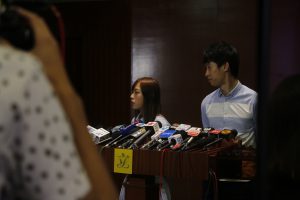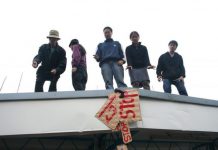Politicians and parties labelled as localist embrace different ideologies
by Chester Chan & Rammie Chui
As Sixtus Leung Chung-hang and Yau Wai-ching of Youngspiration stepped up to take their oaths of office as legislative councillors last month, they unfurled flags proclaiming “Hong Kong is not China”. Leung vowed to serve the “Hong Kong nation”.
To many observers, this was a sign of things to come for the next four years, after six new non-establishment lawmakers from outside the traditional pan-democratic camp were elected in September. In the wake of their victories, local and international media were quick to hail a new post-Umbrella Movement era in Hong Kong politics. Many headlines referred to their election as a victory for “localists” (本土派).
But the all-embracing term hides the fact there are significant differences in ideology among those who have been grouped together under the label. Today, the term “localist” is most commonly associated with those who seek a separate identity from China, in some cases a separate nation, and who take an antagonistic attitude towards Mainlanders.
However, these qualities may not best describe the views of Eddie Chu Hoi-dick, one of the six new legislators to be placed under the label. Chu was one of the activists who promoted “local” (本土) values a decade ago when the movement was more focused on creating a Hong Kong identity through preserving Hong Kong’s unique heritage, sharing common experiences and values and rethinking Hong Kong people’s relationship with the land.
These earlier approaches to localism have been virtually eclipsed since the announcement of the restrictive framework for universal suffrage by the National People’s Congress Standing Committee (NPCSC) and the 79-day Occupy Movement in 2014. Since 2014, the tension between mainland China and Hong Kong has not eased. Issues such as parallel trading, the disappearance and arrests of Hong Kong booksellers and the disqualification of pro-independence candidates in the Legislative Council election have further worsened Hong Kong-Mainland China relations.
This has prompted some to worry about the future of Hong Kong after 2047, when the Sino-British Joint Declaration’s guarantee that Hong Kong’s pre-1997 way of life would remain unchanged for 50 years comes to an end. And instead of calling for the government to re-initiate the process of political reform, the new non-establishment politicians are proposing self-determination for Hong Kong. Although the six legislators who have been branded localists all support the idea of self-determination, political scientist Ma Ngok says they have very different values.
“Their ideologies are very different, one is right-wing, the other left-wing, they are two extremes,” says Ma, an associate professor from the Department of Government and Public Administration at the Chinese University of Hong Kong (CUHK).
Ma says it is difficult to define localists but based on the September legislative council election, he says the new forces can be split into two camps.
The first camp, which he would call localist, comprises the CPR Alliance (Civic Passion led by Cheng Chung-tai, Proletariat Political Institute led by Raymond Wong Wuk-man and Hong Kong Resurgence led by Horace Chin Wan-kan) and Youngspiration and the only openly pro-independence candidate Chan Chak-to.
Ma says these parties or groups emphasise the idea of Hong Kong nationalism which he says can lead to more xenophobic emotions. He cites the views of Chin from Hong Kong Resurgence, whose advocacy of “Hong Kong City-State Theory” contains racist elements that denigrate Mainlanders and opposes new arrivals coming from the Mainland. Some of the anti-parallel trader actions organised by other localist groups also involve activities and rhetoric that discriminates against Mainlanders.
In contrast, Ma describes the main members of the other “localist” camp – Eddie Chu Hoi-dick from the Land Justice League, teacher Lau Siu-lai who organised roadside “democracy classrooms” during the Occupy Movement and former Occupy Movement student leader Nathan Law Kwun-chung from Demosisto – as self-determination advocates.
Ma finds it ironic that Chu, Lau and Law are also called localists when in fact, they are often attacked by localists as “left plastic” or “leftards”, a derogatory term used to describe left-leaning individuals who believe in peaceful, rational protest. Ma says relative to the right-wing localists, the self-determination camp is left-wing, stresses the need for equality, upholds universal values and does not encourage discrimination against any groups in society.
While all the parties agree Hong Kong people should have the right to decide their future, they have different visions of how that should be achieved.
Founded in 2012, Civic Passion began to position itself as a localist party around a year later. Cheng Chung-tai, who now chairs the party, says Hong Kong’s distorted political situation – Beijing’s intervention and the deprivation of Hong Kong people’s rights – are what led to the rise of localism as a force.
During the legislative council election, CPR campaigned on a platform of extending the Basic Law in perpetuity, with Hong Kong people having the right to amend it through a de facto referendum, as a way to assert Hong Kong’s autonomy.
“Being able to amend the constitution implies that Hong Kong people are vested with their political autonomy,” says Cheng, who argues such an arrangement would give Hong Kong the de facto powers of an independent entity.
Cheng says Hong Kong cannot bear the consequence of a bloody revolution and that his party’s suggestion is more practical. There is nothing wrong with the nature and framework of the Basic Law, he says, the problem is its substance – such as Article 5, which states a 50 year limit on Hong Kong’s existing systems and way of life.
Critics have argued that despite their localist positions, Civic Passion’s acceptance of the Basic Law beyond 2047 implies acceptance of Chinese sovereignty.
“Does sustaining the Basic Law mean agreeing with Chinese sovereignty? Does drinking water from Dong Jiang River mean agreeing with Chinese sovereignty?” says Cheng, arguing this is not a valid discussion.
This puts him at odds with the post-Occupy Movement party, Demosisto, founded by former members of Scholarism and the Hong Kong Federation of Students.
“The Basic Law suppresses dissidents and is always being interpreted according to the mainland Chinese government’s will. I don’t understand why we should still sustain it,” says Joshua Wong Chi-fung, the secretary general of Demosisto.
Wong believes Hong Kong people should have the right to decide the city’s future. He says Hong Kong was cheated of the United Nations recognition of the right of former colonies to pursue self-determination after China lobbied for it to be removed from the list of colonies in 1972.
To achieve its goal of self-determination, Demosisto proposes a “Charter of Hong Kong” to introduce the establishment of a Referendum Law in Hong Kong. Wong says they want to work for a consensus in society and actively lobby international support. He says any referendum must have credibility at home and abroad, and should include different options on the future of Hong Kong, including independence and the current One-country, Two Systems model.
Demosisto describes their position as being one of democratic self-determination, and it is one which the other two newly elected independent Legislative Councilors Eddie Chu Hoi-dick and Lau Siu-lai also share. However, while Demosisto is more focused on political development, Chu and Lau place greater emphasis on social issues. Chu is focused on environmental, land and development issues whereas Lau focuses more on labour and welfare and the rights of the underprivileged.
Self-determination is also a key term for Youngspiration, another post-Occupy political party mainly supported by youngsters. But unlike Demosisto, Chu and Lau, Youngspiration advocates “national self-determination” rather than “democratic self-determination”. Joshua Wong says his party does not believe a restrictive nationalist framework is necessary to attaining self-determination and thinks Youngspiration fails to clearly define who would belong to a Hong Kong nation.
However, Youngspiration legislator Yau Wai-ching thinks it is necessary to stress Hong Kong’s separateness from the Mainland and to promote Hong Kong people’s identity and sense of belonging as a nation. She says Hong Kong’s future should be determined by those who are conscious of their Hong Kong identity.
“We are not just simply using a document to determine who can take part in the determination of Hong Kong’s future but by their ideology, whether they agree with Hong Kong’s values and are willing to contribute themselves,” Yau says.

She proposes that new immigrants from the Mainland and foreigners who settle in Hong Kong should pass a citizenship test – encompassing language ability, knowledge of Hong Kong history and culture and civic knowledge – to be eligible to join the Hong Kong nation.
On the Basic Law, both Demosisto and Youngspiration believe the mini-constitution and the Joint Declaration were drawn up without the mandate of Hong Kong people. Youngspiration’s Yau Wai-ching says it should be abolished.
Apart from their beliefs about the future of Hong Kong, Youngspiration has different views from Demosisto on issues like the June Fourth crackdown and the democratic movement in the Mainland. Demosisto supports the rehabilitation of those who took part in the protests. They see the incident as a part of Hong Kong local history and believe it is impossible to isolate Hong Kong’s politics from the Mainland’s geopolitical influence.
But Youngspiration’s Yau disagrees. “There is not even any democracy in Hong Kong. How come you’ll help establish a democratic China?”
Youngspiration worked with Hong Kong Indigenous (HKI) during the Legislative Council election by substituting the disqualified HKI candidate Edward Leung Tin-kei with Sixtus Leung. They share similar views on Hong Kong’s status although Youngspiration pointedly stop short of saying it supports independence.
Yau says the two groups have different strategies, however, with HKI advocating street protests and Youngspiration focusing on community work and the Legislative Council.
Among the localists, the Hong Kong National Party is the most explicit in its advocacy of Hong Kong independence.
“Is there another way out? One country, two systems will only preserve Hong Kong’s situation in such a way that it will eventually become a city of China. Hong Kong independence is all [we have] left,” says Chan Ho-tin, the party convener.
Chan says the party wants to safeguard Hong Kong’s core values and unique identity in the face of what he calls Chinese colonisation. He says they do not rule out any possibilities, including violence, to achieve this goal. But he rejects the idea of a civic referendum.
“To me, I don’t really care about procedural justice,” says Chan who says the end is more important than the means. He adds the result of a referendum may be affected by the growing number of new immigrants from the Mainland.
Chan’s dismissal of the importance of procedural justice is in stark contrast to Joshua Wong’s view on the need for a credible referendum on 2047. The divergence of views shows how Hong Kong’s political spectrum has widened since the pre-Occupy Movement characterisation of politics as pro-establishment and pan-democratic.
Instead of using a broad meaning of “localist” to label the non-establishment forces outside of the pan-democratic camp, Suzanne Pepper a Hong Kong-based American blogger who writes extensively about Hong Kong politics, has identified three categories. The first is those who seek independence such as the Hong Kong National Party, the second are “local separatists” who seek a separate Hong Kong identity. Under the second category, Pepper places Hong Kong Indigenous, Youngspiration and Civic Passion. Pepper’s third category is “local self-determination” which she uses to describe Demosisto, Lau Siu-lai and Eddie Chu.
In Hong Kong today, the term “localist camp” (本土派) is usually understood to refer to those who stress Hong Kong’s separate identity and who are generally hostile to the Mainland but Pepper’s categorisations suggest there is more than one way to understand “local”(本土).
Now read the next story in this series The Changing Face of Localism
Edited by Karen Yu













































